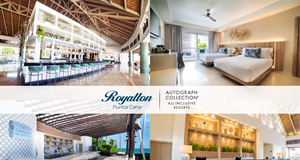Special To NAN
News Americas, MONTREAL, Canada, Fri. Nov. 29, 2013: The ride from the international airport in Port-au-Prince to the suburb of Pétionville is long and dusty. On either side of the road are snapshots of life in a country that is still recovering from an earthquake that struck one quiet January night nearly four years ago, leaving more than a million people without homes.
Women and men walk purposefully down the streets balancing baskets on their heads – baskets crammed with items that will presumably end up in a stew pot. Roadside vendors sell T-shirts that, judging from the slogans, might have been donated by North Americans after the quake while manic minibuses, or tap-taps, are a colorful addition to the parade of traffic.
“Haiti is a big country,” said Tourism Minister of Haiti, Stephanie Villedrouin. “We have beautiful beaches, caves and national parks but the added value is our culture, art, food, music, festivals and people.”
The U.S. and Canada still ranks as numbers one and two on Haiti’s source of tourist list.
Port-au-Prince offers a myriad of sites, from the Muse Pantheon with its impressive collection of artifacts, to the l’Observatoire de la reconstruction, which offers panoramic views of the city from high in the mountains.
Named after the first President of the Republic, Alexandre Petion, Petionville, is tourist friendly with a smattering of galleries, restaurants, nightclubs and Haiti’s only golf course.
The Best Western Premier recently became the first branded hotel to open in Port-au-Prince in 15 years. It tempts with a whiskey bar, spa, French-inspired Le Michel restaurant and artwork made from car tires and cork from old wine bottles.
The only non-Haitian employed in the hotel, general manager Ronald Maidens, has worked in the hospitality industry for decades, including at the Stanhope in Manhattan.
“I was, quite frankly, overwhelmed,” he said, referring to the 3,000 people who applied for 100 jobs. “I did nothing else for one month but look at resumes.”
Formerly a math teacher, Wedney Rameau was offered one of those jobs and is now a server in Le Michel.
“I wanted to do better in life,” he said while pouring a cup of espresso brewed from the beans grown in the mountains of Haiti. “When the hotel was advertising jobs, I knew I had to be lucky enough to get one.”
Three hours south of Port-au-Prince, in the coffee port of Jacmel, snow white beaches and pristine waters beckon beach lovers, scuba divers and snorkelers.
While Bassin Bleu, a mountain river north of Jacmel, is more for nature lovers with its almond trees, coconut palms, lazy lizards and goats that make their home in the wild.
EDITOR’S NOTE: Melanie Reffes is an award-winning travel journalist based in Montreal, Canada who specializes in sunnier climes. Her Caribbean coverage has appeared in newspapers and magazines including Dreamscapes, Miami Herald, Caribbean Connection and Canadian Traveller. She is a contributing writer for many island-based magazines including Experience St. Maarten, Experience Bermuda, Nights St. Maarten, Nights Aruba, Nights Curacao, Destination St. Maarten and Destination St. Kitts/Nevis. She can be reached at [email protected].








